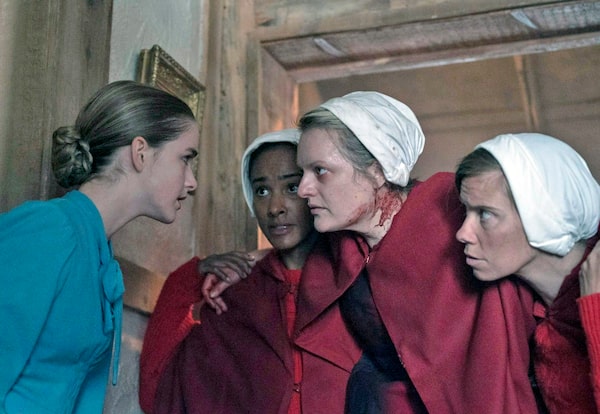
There is little that’s benign about June now, and Elisabeth Moss’s (second from right) uncanny expression of intense wrath is unnerving.Sophie Giraud/CTV Drama Channel
On Wednesday evening, President Joe Biden will mark his first 100 days in office with a speech to a joint session of Congress (all U.S. networks, 9 p.m.) He is expected to outline his priorities and note his administration’s accomplishments to date. The event is a marker, drawing a line between the Trump era and now, with the immediate future in focus.
At exactly the same time, The Handmaid’s Tale returns, on Hulu in the United States, and in Canada on the CTV Drama Channel (Wednesday 9 p.m. on what used to be called Bravo). The series, based on Margaret Atwood’s novel though much expanded from that, is now into its fourth season. It is nearly redundant to point out that when the show arrived in the spring of 2017, its resonance was loud because the misogynistic, religious conservatism of the setting, Gilead, aligned in the public imagination with the misogynistic, conservative tone of the newly arrived Trump administration.
The 21 best TV series to stream so far in 2021
Now, with that period ending, as many think and hope, what is the pertinence of this often macabre, dystopian series? Well, it still resonates with raging fury. As drama, mind you, it is unbudgeable; the first new episodes present a surly bleakness, a study of the impact of a life lived under extreme torment and, eventually, a shift toward sparse optimism. To get to that point, viewers must commit to several episodes that feature a truculent kind of sadism. Watching The Handmaid’s Tale is its own kind of glorious martyrdom.
Thankfully it remains a thriller, first and foremost. When we last saw June (Elisabeth Moss) back in 2019, she’d engineered the flight of 86 children from Gilead to Canada. Her keepers, the Waterfords (Joseph Fiennes and Yvonne Strahovski) were under arrest in Canada. This season starts right there. Stuck in Gilead, a seriously injured June is on the run, leader of a gang of Handmaids and she’s public enemy number one.
There is a thrilling rush to these scenes and the series remains startlingly, gorgeously pictorial in a way no other series can match for its grave attention to light, the landscape (Southern Ontario) and the sometimes exquisite use of the colour red. While you are lost in admiring the beauty, June and her cohorts arrive at a safe place, a remote rural pig farm. There’s relief there but as the first two episodes unfold, the answer to a certain question takes over. And that question is this: What has her excruciating life in Gilead done to June?
In part the answer is embodied in the more junior figure of Mrs. Keyes (an astonishingly forceful turn by Mckenna Grace), who came to the farm, before it was liberated, as a child-bride. A walking, talking torrent of fury and vengeance, this teenager helps provoke in June the inevitable outcome of June’s own bitter battles. There is little that’s benign about June now, and Moss’s uncanny expression of intense wrath is unnerving. At this point, the series is a disturbingly ferocious revenge thriller; June is battered, full of hate and indomitable.
In the way this series has always evolved, you know that punishment is coming. We see Aunt Lydia (Ann Dowd), who has been harshly disciplined for allowing the escape of the children to Canada and June to somewhere unknown. Lydia pledges a revenge against June that you sense will be unspeakable. It is not giving too much away to warn that a later episode, directed by Moss herself, reaches a new level of pitiless persecution that is discomforting to watch.
We get glimpses, too, in the early going, of the shifting fate of Commander Lawrence (Bradley Whitford), who faced a possible death sentence for helping June. There’s a subtlety to Whitford’s performance that is a welcome relief from the intensity of everyone who surrounds June. There is story expansion, too, in the scenes portraying those from Gilead now anchored in Toronto.
Moira (Samira Wiley) and Emily (Alexis Bledel) are free but struggling. And there is Rita (Amanda Brugel, in a role very different from her work on Kim’s Convenience), who has her own agonies in Canada. Naturally, Canadian viewers will get a kick out of the talk about Gilead invading Canada and the ensuing diplomatic machinations.
It’s been said that The Handmaid’s Tale hasn’t really moved forward in its story, that it repeats June’s suffering over and over. But that’s the engine that drives it – it roars without rushing forward and it’s fuelled by activist fury at the treatment of women. You need to be prepared for that and, in doing so, recognize its grimly enduring relevance. Trump might have been defeated but what he represents is alive and seething.
Plan your screen time with the weekly What to Watch newsletter. Sign up today.